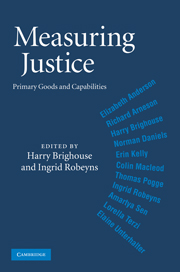1 - Introduction: Social primary goods and capabilities as metrics of justice
Published online by Cambridge University Press: 05 June 2012
Summary
THE METRIC OF JUSTICE
Over the last decades, political theorists and philosophers have at length debated the question what the proper metric of justice is. In other words, they have sought to answer the question “what should we look at, when evaluating whether one state of affairs is more or less just than another?” Should we evaluate the distribution of happiness? Or wealth? Or life chances? Or some combination of these and other factors? The Rawlsian social primary goods approach and the capability approach are two prominent answers to this question. The aim of this volume is to present a systematic study of these two approaches to measuring justice.
Building on the work of John Rawls, some theorists use the social primary goods approach. Social primary goods are, according to Rawls, those goods that anyone would want regardless of whatever else they wanted. They are means, or resources (broadly conceived), and this approach says that we should compare holdings of such resources, without looking closely at what individuals, possessed of heterogeneous abilities and preferences, can do with them. Rawls (2001, pp. 58–61) specifies the social primary goods in a list as follows:
i) The basic liberties (freedom of thought and liberty of conscience, etc.) are the background institutions necessary for the development and exercise of the capacity to decide upon and revise, and rationally to pursue, a conception of the good. Similarly, these liberties allow for the development and exercise of the sense of right and justice under political and social conditions that are free. […]
Keywords
- Type
- Chapter
- Information
- Measuring JusticePrimary Goods and Capabilities, pp. 1 - 14Publisher: Cambridge University PressPrint publication year: 2010
References
- 16
- Cited by



